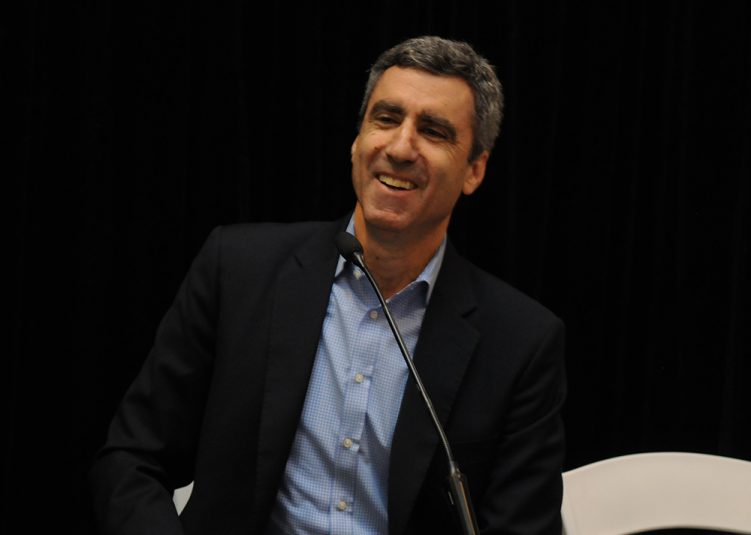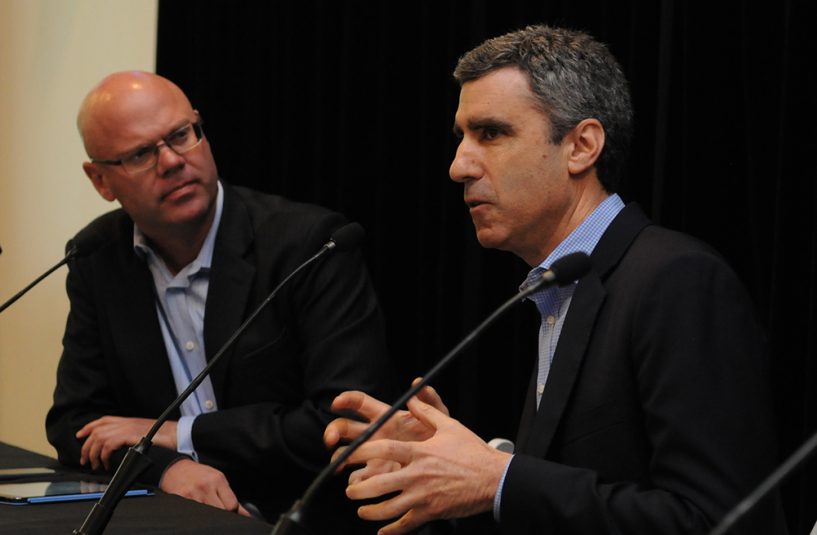SVG IP Production Forum: NBC Olympics President Zenkel Details Launch of The Olympic Channel
The year-round network will have ‘a credible tens of millions of homes’ at the start
Story Highlights
With the debut of The Olympic Channel: Home of Team USA less than five months away, NBC Olympics is ramping up production and operations efforts at its Stamford, CT, broadcast center.
The IOC launched The Olympic Channel as a worldwide digital platform following Rio 2016 and already offers live and original content to partners throughout the world. However, this summer, NBC, the USOC, and the IOC will launch a year-round linear cable channel focused on Olympic-sport programming with an emphasis on U.S. athletes. The dramatic move, announced in December, becomes all that more intriguing because many in the industry predict the imminent the death of niche cable networks.

NBC Sports’ Gary Zenkel: “We expect sponsors to be a bit more engaged knowing there is a television distribution platform for all of this content.”
“Who launches a cable channel in this environment? The answer is, we are going to,” Gary Zenkel, president, NBC Olympics and Business, NBC Sports Group, said at SVG’s IP Production Forum in Stamford on Wednesday. “Strategically for us, in this highly fragmented world, breaking through the fragmentation and individually personalized viewing today and getting people excited about the Olympic Games is harder. So having a vehicle we could utilize to continue to talk about the athletes and the stories that really resonated and then begin to introduce those who are going to be introduced on the Olympic stage, we thought this was an opportunity we should take advantage of.”
During his opening keynote conversation, Zenkel revealed that NBC had entered its last cycle of negotiations with large MVPDs with The Olympic Channel as part of the NBC bundle. Although Zenkel declined to reveal the specific number of homes NBC Sports expects to have at the launch of The Olympic Channel this summer (the specific date yet to be announced), he is confident that it will have a sizable subscriber base.
“Leaning into a pretty stiff headwind, we went into distribution cycle for NBC … and came out the other side at the end of last year with very good results,” he said. “When we launch this channel [this summer], we will have a very credible tens of millions of homes.”
Why Launch a Cable Channel Now?
Although much of the hot-stove conversation around the media industry has centered on the death of cable over the past two years, Zenkel believes a linear cable network is key to the success of The Olympic Channel platform in the U.S.
“This is a way to get clearly in front of an audience,” said Zenkel. “When you are living in the densely populated digital forest, it’s not simple to get attention of the audience. When you are a cable channel … working with MVPDs and using our promotion muscle, we think we can direct people there. We expect sponsors to be a bit more engaged knowing there is a television distribution platform for all of this content.”

NBC Sports’ Gary Zenkel (right) in conversation with SVG Co-Executive Director, Editorial Services, Ken Kerschbaumer
However, Zenkel stressed that The Olympic Channel effort is about much more than just a single cable network. Besides the channel, additional coverage of Olympic sports programs will appear exclusively on other NBCU platforms, including NBC, NBCSN, and NBC Sports Digital outlets.
“Thinking of this as a single channel is really a misrepresentation,” said Zenkel. “It’s not single channel; it’s really a distribution system across NBC networks: the dedicated linear channel, the digital channel — web and app — and then promotional extensions to push out the content being created.”
Original Content Is Key
The U.S.-facing cable channel will lean heavily on the stable of original content already being produced by the IOC and OBS (Olympics Broadcasting Services) for the global Olympic Channel. Currently, that channel has more than 25 series produced or currently in production, according to Zenkel, and that is just the first wave of content. This content, along with NBC Olympics’ archive and consistent flow of fresh content, will support the live event programming on the U.S. version.
“What the IOC is doing in their investment in this endeavor is commissioning the production of a tremendous amount of original content produced by great producers around the world,” Zenkel explained. “We, through the partnership, will be given access to all that content and take advantage of a lot of the content we have produced. We can intermingle that with a lot of the event coverage.”
Looking Ahead to PyeongChang
Following soon after The Olympic Channel debuts, NBCU’s coverage of The 2018 PyeongChang Olympics of the Winter Games, which begin Feb. 9, will have no shortage of outlets, given the Peacock’s bevy of cable networks and digital outlets. As a result, The Olympic Channel will have little or no live event programming. Instead, Zenkel, noting that NBC is still working out the network’s role for PyeongChang, sees The Olympic Channel potentially as a prime destination for viewers looking for deeper analysis of the games.
“The live competition programming is more or less accounted for [on other NBCU networks], so the direction we are talking a lot about now is, The Olympic Channel becomes a place where we can talk to athletes, experts, coaches, our on-air talent through the course of the day,” he said. “It’s a place to catch up and get a little more analysis. The afternoon in the U.S. will also be dark, so that’s a place where people may drop in to The Olympic Channel, get caught up, and get excited about what’s coming up that evening. That’s the direction we’re headed, but we are not locked into that.”
